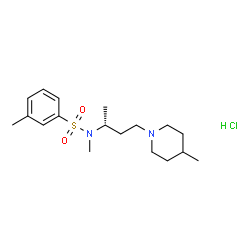1217674-10-6
| Name | SB 258719 hydrochloride |
|---|---|
| Synonyms |
N,3-Dimethyl-N-[(2R)-4-(4-methyl-1-piperidinyl)-2-butanyl]benzenesulfonamide hydrochloride (1:1)
N,3-Dimethyl-N-[(2R)-4-(4-methylpiperidin-1-yl)butan-2-yl]benzenesulfonamide hydrochloride (1:1) Benzenesulfonamide, N,3-dimethyl-N-[(1R)-1-methyl-3-(4-methyl-1-piperidinyl)propyl]-, hydrochloride (1:1) |
| Description | SB 258719 (hydrochloride) is a selective 5-HT7 receptor antagonist displayed high affnity (pKi=7.5) for the receptor. SB-258719 (hydrochloride) can be used for the research of cancer and neurological diseases[1][2]. |
|---|---|
| Related Catalog | |
| Target |
5-HT7 Receptor:7.5 (pKi) |
| In Vitro | SB-258719 (1, 3 and 10 μM; HEK 293 cells) (hydrochloride) produces a concentration-related rightward-shift of the 5-CT concentration-response curve with no signifcant alteration in the maximal response to 5-CT[1]. |
| In Vivo | SB-258719 (5~20 mg/kg; i.p.) (hydrochloride) significantly attenuates the 5-CT-induced hypothermia[2]. Animal Model: Male Swiss Webster mice (20~25 g)[2]. Dosage: 5~20 mg/kg Administration: I.p. Result: Significantly attenuated the 5-CT-induced hypothermia. |
| References |
| Molecular Formula | C18H31ClN2O2S |
|---|---|
| Molecular Weight | 374.97 |
| Exact Mass | 374.179474 |
